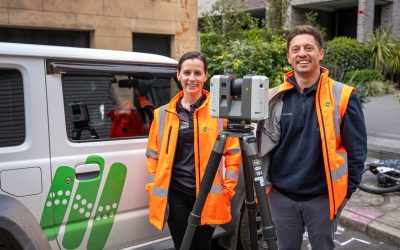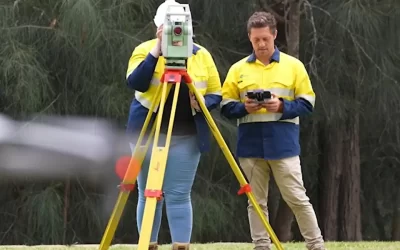A registered land surveyor in Australia plays a vital role in measuring, mapping and analysing land and property boundaries. These skilled professionals provide essential services across construction, infrastructure and property development sectors.
Professional qualifications serve as the foundation of surveying excellence. A qualified land surveyor possesses the technical expertise, legal knowledge and practical skills needed to deliver accurate results that protect property rights and support development projects.
This guide explores the comprehensive qualification requirements for Australian surveyors, including:
- Educational pathways and accredited degrees
- Mandatory practical training periods
- Professional examination processes
- Registration procedures and legal obligations
- Recognition of international qualifications
Whether you’re seeking to become a site surveyor or looking to engage a survey company, understanding these qualification standards helps ensure you work with properly certified professionals who maintain the highest industry standards.
1. Educational Requirements for Australian Surveyors
To become a qualified surveyor in Australia, you need to go through extensive academic training. The starting point for professional practice is a four-year bachelor’s degree in surveying or a related field.
Accredited university programs include:
- Bachelor of Applied Science (Surveying) – RMIT University
- Bachelor of Spatial Science (Surveying) – University of Southern Queensland
- Bachelor of Engineering (Surveying) – University of New South Wales
2. Practical Training and Work Experience
Aspiring surveyors must complete supervised practical training after their academic studies. This hands-on experience takes place under the guidance of a registered surveyor who acts as a mentor throughout the training period.
The practical training phase typically lasts 2-4 years, during which candidates:
- Gain experience with surveying equipment and technology
- Learn to apply theoretical knowledge to real-world scenarios
- Develop project management and client communication skills
- Master local surveying regulations and standards
A structured training program includes:
- Fieldwork experience
- Data processing and analysis
- Report writing and documentation
- Application of professional ethics
This supervised experience is essential for:
- Building professional competence
- Understanding practical challenges
- Developing problem-solving abilities
- Establishing professional networks
The training period allows candidates to work on diverse projects across residential, commercial, and infrastructure sectors. Through direct involvement in actual surveying tasks, trainees learn to handle complex situations, manage time pressures, and deliver accurate results that meet industry standards.
3. Board Examinations and Competency Assessment
To become a registered surveyor in Australia, you must pass rigorous board examinations that assess your professional competency. Each state’s surveying board administers specific tests to evaluate:
- Technical Knowledge
- Advanced surveying calculations
- Boundary determination principles
- Modern surveying equipment operation
- Data analysis and interpretation
- Legal Understanding
- State-specific surveying legislation
- Property law fundamentals
- Professional practice requirements
- Ethics and professional conduct
The examination process varies across Australian jurisdictions. Here’s what you can expect in different states:
- In New South Wales (NSW), candidates will undergo a comprehensive assessment of their Professional Training Agreement.
- In Queensland, candidates are required to complete the competency framework set by the Queensland Board of Surveyors.
Assessment methods may include:
- Written examinations
- Practical field tests
- Professional interviews
- Project-based assessments
In NSW, the Board of Surveying and Spatial Information (BOSSI) has implemented a structured examination program. This program requires candidates to demonstrate their proficiency in various areas such as cadastral surveying, engineering surveys, and town planning principles.
On the other hand, Queensland’s Board focuses on competency-based assessments through practical projects and detailed reports.
4. Registration Process for Land Surveyors in Australia
The path to becoming a registered surveyor in Australia involves a structured application process through state-specific surveying boards. Each jurisdiction maintains its own registration requirements and procedures.
Key Registration Steps:
- Submit completed application forms to relevant state board
- Provide certified copies of qualifications
- Present evidence of practical training completion
- Include professional references
- Pay registration fees
- Attend professional interview (if required)
The Surveyor General’s office in each state maintains the official register of licensed surveyors. This register serves as a public record of qualified professionals authorised to perform cadastral surveys.
Benefits of Registration:
- Legal authority to certify land boundaries
- Access to exclusive government contracts
- Professional recognition
- Higher earning potential
- Ability to establish private practice
Professional Responsibilities:
- Maintain accurate survey records
- Update technical knowledge regularly
- Comply with surveying legislation
- Uphold professional standards
- Participate in continuing education
Registration renewal requirements vary by state, with most jurisdictions requiring annual updates and proof of ongoing professional development activities.
6. Additional Legal and Professional Obligations for Licensed Land Surveyors in Australia
Professional land surveyors in Australia must maintain strict compliance with several legal and professional obligations:
Professional Indemnity Insurance
- Mandatory coverage for private practitioners
- Protection against claims of professional negligence
- Minimum coverage requirements vary by state/territory
- Annual policy renewal essential for continued practice
Advertising Regulations
- Clear representation of qualifications and registration status
- Accurate description of services offered
- Prohibition of misleading claims about expertise or experience
- Compliance with Australian Consumer Law requirements
Boundary Survey Standards
- Adherence to state-specific survey practice directions
- Implementation of current measurement technologies and methods
- Maintenance of detailed field notes and documentation
- Strict compliance with cadastral surveying regulations
- Protection of property boundaries through accurate documentation
Land surveyors must also maintain comprehensive professional records, participate in regular professional development activities, and stay current with evolving industry standards and technological advancements. These obligations ensure the delivery of high-quality surveying services while protecting both practitioners and their clients.
7. Mutual Recognition and Overseas Qualifications
Australia’s mutual recognition system enables registered surveyors to work across different states and territories through a streamlined registration process. Each jurisdiction maintains specific requirements, yet the Mutual Recognition Act 1992 facilitates professional mobility nationwide.
Interstate Registration Process
The interstate registration process involves:
- Submitting proof of current registration from original jurisdiction
- Completing application forms for the new state/territory board
- Paying applicable registration fees
- Meeting local continuing professional development requirements
Qualification Assessment Process for International Surveyors
For international surveyors, the qualification assessment process includes:
- Evaluation of academic qualifications through a recognised assessment authority
- English language proficiency testing (IELTS or equivalent)
- Demonstration of relevant work experience
- Completion of additional bridging courses if required
Role of the Bureau of Assessment of Overseas Qualifications
The Bureau of Assessment of Overseas Qualifications assists international candidates by:
- Assessing educational equivalency to Australian standards
- Identifying gaps requiring supplementary education
- Providing guidance on registration pathways
- Supporting documentation requirements
Successful overseas applicants must then complete local registration requirements, including supervised practical experience and board examinations specific to Australian surveying standards and legislation.
The Role of Professional Surveying Services in Australia Today
Professional surveying services play a vital role in Australia’s development landscape, offering specialised expertise across diverse sectors. Modern surveying companies provide an extensive range of services:
1. Land Surveying
- Boundary definitions
- Subdivision planning
- Topographic mapping
- Construction set-out
2. Site Surveying
- Detailed site analysis
- Building positioning
- Level and gradient assessments
- Underground utility mapping
Qualified registered surveyors bring precision and legal compliance to every project. Their expertise ensures accurate measurements, proper documentation, and adherence to regulatory requirements—critical factors that safeguard property rights and support development decisions.
Professional surveying companies like Wumara deliver comprehensive project management solutions that extend beyond basic measurements. These services include:
- Indigenous procurement consulting
- Engineering coordination
- Subsurface utility detection
- Infrastructure planning support
The integration of advanced technology with traditional surveying methods has transformed service delivery. Modern surveyors use:
- 3D laser scanning
- GPS systems
- Drone technology
- Digital mapping software
These innovations enable surveyors to provide faster, more accurate results while maintaining the highest standards of professional practice. Professional surveying services continue to evolve, meeting the growing demands of Australia’s property, construction, and infrastructure sectors.
Why Choose Wumara for Your Land Surveying Needs?
Wumara Group has extensive expertise in surveying and subsurface utility locating across the NSW and QLD markets. Our skilled team supports land development, property sales, and infrastructure projects with accurate results and end-to-end services. Whether you’re subdividing parcels, preparing legal descriptions, or need a topographic survey, we have the experience to deliver.
As part of the surveying profession, our licensed land surveyors, including cadastral surveyors, specialise in accurately determining boundaries, measuring distances, and identifying control points to produce plans and legal documents essential to the location, elevation, and surface location of land parcels. We also assist architects, developers, and project managers with research, observation, and aerial photography to inform design and planning processes.
Our clients consistently praise our:
- Rapid response times — sometimes within a single day
- Professional, friendly approach grounded in industry confidence
- Competitive cost and transparent pricing
- Outstanding service quality across every mission
Recent successful partnerships include major telecommunications projects with CI International, City of Sydney Council, Telstra, and NBN, as well as key support for School Infrastructure NSW. From hydrographic surveys to subdividing parcels, our services are designed to meet the evolving needs of the profession and the future of Australian infrastructure.
Ready to discuss your surveying requirements? Contact Wumara Group for tailored solutions that meet your specific project needs and move your business forward with clarity and precision. Our experienced land surveyors are here to help bring your vision to life.





